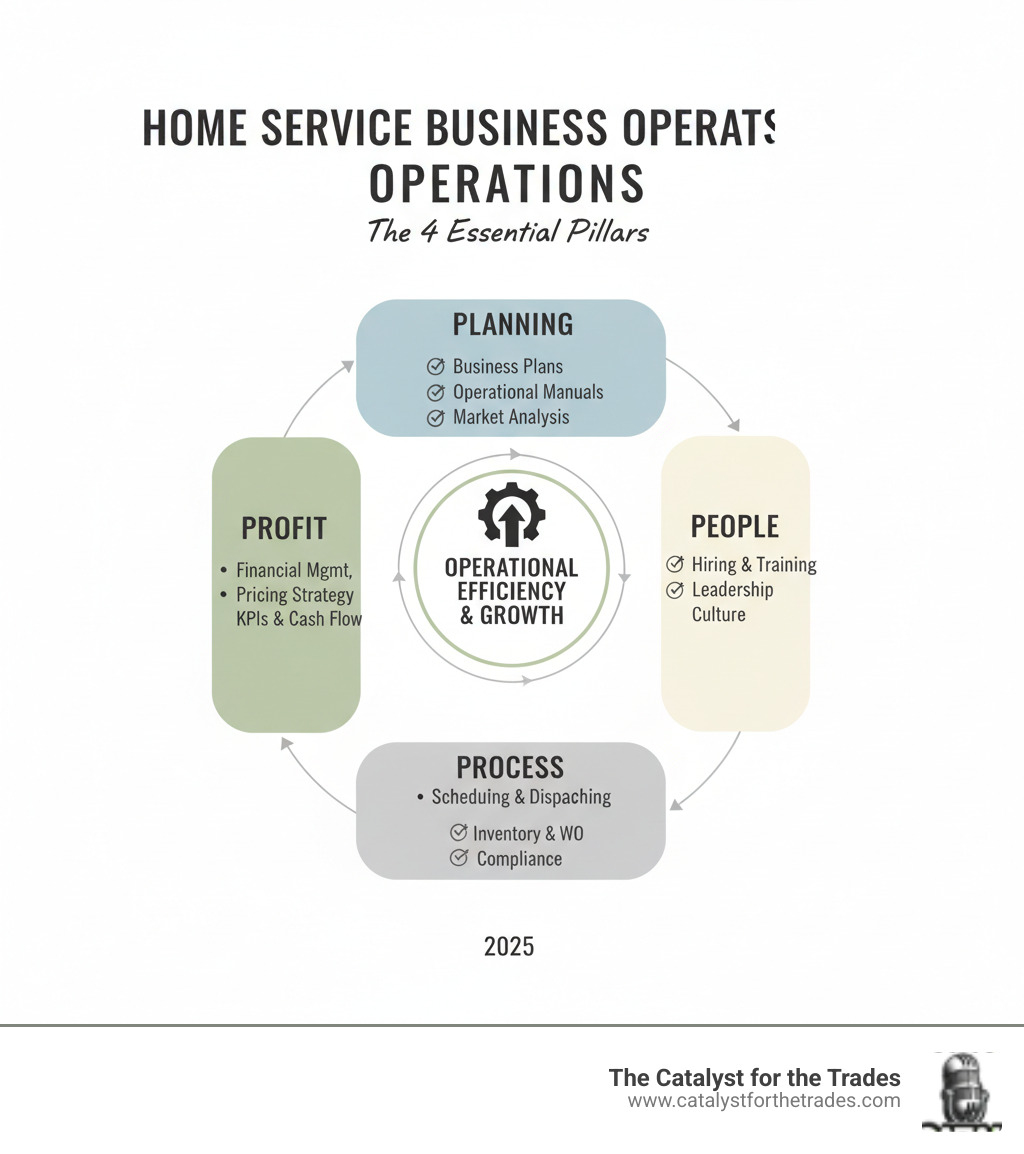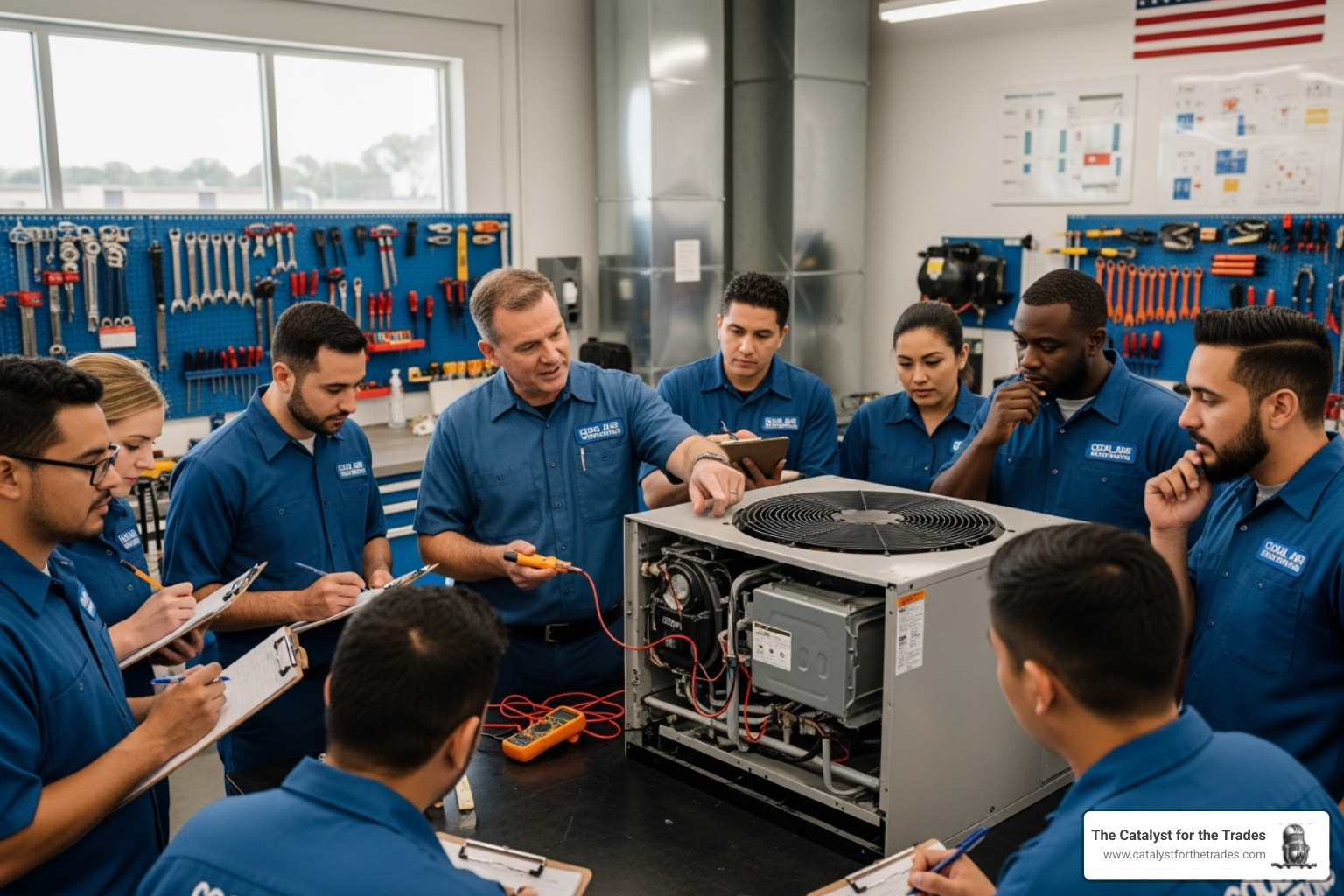Discover business acumen: core components, traits of leaders, development steps & metrics to boost decision-making and scale success.

The Operational Edge: Boosting Efficiency in Your HVAC, Electrical, or Plumbing Business
Why Strong HVAC Business Operations Matter More Than Ever
HVAC business operations are the systems that keep your company running smoothly and profitably. Effective operations management focuses on four core pillars: Planning, People, Process, and Profit.
You started your business with technical skills, but now you're managing people, inventory, and cash flow. This is the reality for most home service owners: the skills that got you started aren't enough to scale.
The global HVAC market is projected to grow by more than 5% by 2028, but growth without systems creates chaos. The difference between businesses that scale and those that plateau isn't talent—it's operations.
Operational efficiency determines whether you spend your days putting out fires or building a sustainable business that can run without you. It's the key to retaining talent and converting new customers.
The challenge is real: The HVAC industry was short 110,000 technicians in 2023, and 84% of consumers don't have a specific HVAC company in mind when they search for service. You can't afford inefficiency when talent is scarce and opportunity is high.
This guide offers practical systems to transform your business from reactive to strategic. We'll cover planning, daily operations, team building, and financial management to fuel sustainable growth.

Laying the Foundation: Strategic Planning and Documentation
Many HVAC owners skip planning, but it's why so many businesses hit a ceiling. Before optimizing your daily HVAC business operations, you need a foundation of living documents that guide decisions and train new hires.
The HVAC business model is unique, selling comfort and safety. Smart contractors focus on "gross margin per man day" to guide job selection, targeting around 12% operating income. Startup costs range from $3,000 to $12,000, with many owners leasing vehicles or buying used equipment to manage initial investment.
Market analysis is essential to understand your customers and find gaps in your competitors' services. As James Clear said, "You do not rise to the level of your goals. You fall to the level of your systems." Your business plan builds the systems that make your goals achievable.

What is a Business Operations Manual?
An operations manual is the instruction book for your company, documenting how everything works. This isn't busy work; it's a centralized resource that ensures consistency, boosts efficiency, establishes accountability, and makes your business scalable. New hires can reference procedures for everything from system design to load calculations, accelerating training and reducing mistakes.
Build it once and update it as you grow. For more on scaling operations, check out How to Start, Scale, and Stand Out in HVAC: Jason Walker's Playbook for Modern Home Services.
Essential Components of an HVAC Business Operations Manual
A complete manual is an active tool. It should include:
- Introduction: Company mission, vision, and core values.
- Organizational Structure: A clear chart of roles and responsibilities.
- Daily Procedures: Step-by-step processes for scheduling, dispatching, invoicing, and inventory.
- Work Policies & Safety: Conduct expectations, safety protocols, and customer interaction guidelines.
- Service Descriptions: Details on all services, including installation, maintenance, and repair protocols.
- Customer Service Standards: Guidelines for ensuring a consistent, excellent client experience.
- Technology and HR: Information on software, tools, and human resources procedures.
A thorough manual gives technicians clear protocols for all HVAC business operations, reducing the need for constant guidance.
Creating Your Business Plan
Whether you choose a traditional plan or a lean-startup version, as the U.S. Small Business Administration explains, you need a roadmap. Key components include:
- Executive Summary: A concise snapshot of your company and objectives.
- Company Description: Your story, legal structure, and unique value proposition.
- Market Analysis: Details on your target customers, market size, and competitors.
- Service Line: A breakdown of your offerings.
- Marketing and Sales Strategy: How you'll attract and retain customers.
- Management Team: Who is leading the company.
- Financial Projections: Startup costs, funding needs, and profit and loss forecasts.
A solid business plan forces you to think through challenges, stay focused, and measure progress. For a detailed walkthrough, see How to Create an HVAC Business Plan.
Optimizing Core HVAC Business Operations
With a solid foundation, you can fine-tune your core hvac business operations—the daily work of getting technicians to the right job with the right parts. Most operational headaches stem from poor scheduling, inventory shortages, and communication gaps. Technology can solve these problems.
The HVAC service management software market was nearly USD 800 million in 2022 and is projected to surpass USD 2 billion by 2028. This growth reflects real businesses solving problems with the right tools, processes, and standards.

Streamlining Service Scheduling and Dispatching
Efficient scheduling and dispatching keep your team productive and customers happy. Key improvements include:
- Online Booking: Offers customer convenience and reduces administrative load.
- Route Optimization: Uses software to create the most efficient schedules, cutting fuel costs and increasing jobs per day.
- Skill-Based Assignments: Matches the right technician to the right job, improving first-time fix rates.
- Real-Time Tracking: Provides visibility for accurate ETAs and smarter dispatching decisions.
- Automated Notifications: Keeps customers informed with appointment reminders and on-the-way alerts, reducing no-shows.
Best Practices for Inventory and Work Order Management
Effective inventory management prevents delays and lost profit from missing parts. Use inventory tracking tools for real-time visibility into stock levels and reorder points. Consider just-in-time ordering with reliable suppliers to minimize storage costs. Regularly audit and optimize vehicle stock to reduce trips back to the warehouse.
For work orders, use Standard Operating Procedures (SOPs) and digital templates with checklists. This ensures technicians capture all necessary information, protects your business, and provides valuable service data. These practices improve job speed, billing transparency, and overall customer satisfaction.
The Role of Technology in Modern HVAC Business Operations
Technology is no longer optional. Businesses that accept digital tools operate more efficiently and make smarter, data-driven decisions.
- Automation of routine tasks like invoicing and reminders frees your team for high-value work.
- CRM systems provide a complete customer history, enabling personalized service.
- Digital invoicing and online payments improve cash flow, with 90% of electronic invoices paid on time versus 66% of paper ones.
- Mobile apps empower technicians with job details, customer history, and on-site payment processing.
- Data analytics helps you identify your most profitable services and areas of inefficiency.
- Digital systems also help track safety and EPA Certification, protecting your team and business.
To learn more about how these tools are changing the industry, see How AI and Digital Tools Are Changing the Way Home Services Sell.
Cultivating a High-Performance Team and Culture
Your business is only as strong as your people. If your team isn't motivated and skilled, your hvac business operations will struggle. With the industry short 110,000 technicians, a strong culture is a competitive necessity.
Building a high-performance team means creating an environment where people feel valued, see a future, and understand their purpose. It requires consistent leadership, transparent communication, and a culture people want to join.

Effective Workforce Management and Retention
Finding and keeping skilled technicians is a major challenge, but solving it gives you a massive advantage.
- Recruit creatively by partnering with trade schools, offering apprenticeships, and creating employee referral programs.
- Implement mentorship programs to pair new hires with experienced technicians, accelerating learning and building relationships.
- Provide clear career development paths and support certifications (NATE, ACCA, EPA) to show technicians a long-term future with your company.
- Use performance-based incentives tied to metrics like customer satisfaction and first-time fix rates.
- Build a positive work culture based on mutual respect and recognition. Culture is what makes people stay.
For a deeper dive into building a modern sales culture, check out From Fitness Sales to HVAC Legend: Building a Modern Sales Culture with Darren Tyler Dixon.
The Power of "Why" and Consistent Leadership
As Simon Sinek teaches, great leaders start with why. Articulating your company's purpose beyond making money—like keeping families safe or creating opportunities—attracts people who believe in your mission.
Leadership is a skill separate from technical ability. It's about inspiring people and creating clarity. The "Salt Shaker Theory" from Danny Meyer's book Setting the Table illustrates this. A leader's job is to apply "constant gentle pressure," consistently guiding the team back to the standard of excellence. This is what great leadership in hvac business operations looks like—not micromanaging, but demonstrating the standard until the team internalizes it.
Fostering a Culture of Transparency and Communication
Good communication is essential for operational success. Create open feedback channels and hold regular team meetings to discuss performance, celebrate wins, and create alignment.
Sharing high-level performance data, including financials, helps technicians understand how their daily work impacts the business. When introducing changes to your hvac business operations, involve employees early. Their insights are invaluable, and their participation builds ownership. Transparency means keeping people informed and explaining the "why" behind decisions.
To learn more about building community in the trades, listen to Trailblazing the HVAC Industry: Brittany Doering on Community, Growth, and Conference Success.
Fueling Growth with Smart Marketing and Financial Management
Even the best hvac business operations need effective marketing and financial management to be profitable. With customer acquisition costs at $200-$300 and 84% of consumers undecided on a provider, the opportunity is huge for businesses that get it right.

Digital Marketing Strategies to Reach and Engage Customers
Your online presence is how customers find and evaluate you.
- Website: Your site must be fast, mobile-friendly, and optimized with relevant HVAC keywords.
- Local SEO: A complete Google Business Profile and consistent NAP (Name, Address, Phone) across directories are crucial for appearing in local searches.
- Paid Ads & Social Media: Use Google Ads and social media to target active searchers and engage your community.
- Content & Reviews: Create helpful blog posts or videos to establish authority. Systematically request and respond to online reviews, as 74% of customers read them before buying.
To learn more about digital change, read How to Lead Digital Transformation in Home Service Marketing and Why You Can't Wait.
Maximizing Customer Retention and Repeat Business
Keeping existing customers is more profitable than acquiring new ones. Build loyalty for your hvac business operations through:
- Loyalty Programs & Maintenance Agreements: These provide consistent revenue and create regular, positive touchpoints.
- Exceptional Customer Service: Every interaction should be professional and efficient. Customers value comfort and trust above all else.
- Proactive Communication: Send maintenance reminders and seasonal tips to stay top of mind.
- Smart Upselling: Train technicians to suggest beneficial services like smart thermostats or duct cleaning when appropriate.
Fundamental Principles of Financial Management
Solid financial management is the bedrock of a stable business.
- Budgeting & KPIs: Create a budget to track income and expenses, and monitor Key Performance Indicators (KPIs) like gross profit margin and average ticket size.
- Financial Statements: Regularly review profit and loss statements to understand profitability and make informed decisions.
- Cash Flow Management: Strategically manage cash to steer the industry's seasonal slow periods.
- Pricing Strategy: Set prices that ensure profitability while remaining competitive. The HVAC Pricing Guide: How to Price HVAC Jobs can help.
- Reinvest Profits: Fuel future growth by reinvesting in equipment, training, and marketing. For more, see The Ultimate Guide to Small Business Financial Management.
Frequently Asked Questions about HVAC Business Operations
Here are answers to common questions about improving your hvac business operations.
How can I improve operational efficiency with a limited budget?
High-impact improvements don't have to be expensive.
- Standardize processes with simple checklists to reduce errors and training time.
- Improve communication with brief daily team huddles to keep everyone aligned.
- Optimize scheduling manually by grouping jobs geographically to save time and fuel.
- Cross-train employees to increase flexibility and reduce downtime.
What is the single most important technology for a growing HVAC business?
For a growing business, Field Service Management (FSM) software is the most critical investment. It centralizes scheduling, dispatching, invoicing, and customer management into one system. FSM software provides an immediate, measurable impact on your hvac business operations by connecting your office staff, technicians, and customers. It scales with your business, providing data that informs smarter decisions on hiring, inventory, and growth.
How do I create a strong company culture that attracts top technicians?
In a tight labor market, culture is your competitive advantage.
- Define your "why": Articulate a purpose beyond profit to attract people who believe in your mission.
- Invest in growth: Offer competitive pay, but also provide clear career paths and invest in training and certifications.
- Recognize contributions: Celebrate wins, big and small, to make your team feel valued.
- Empower your team: Trust your technicians with the autonomy and tools to do their jobs well. A strong culture is built on consistent actions that show you care about your people.
Conclusion
The technical skills that launched your company can only take you so far. HVAC business operations—the systems, processes, and strategies holding everything together—are what separate businesses that scale from those that get stuck.
This isn't about working harder; it's about working smarter. By building a solid foundation with strategic planning, optimizing core processes with technology, cultivating a high-performance culture, and fueling growth with smart financial management, you build a profitable, sustainable business.
In a growing market, operations are your competitive advantage. They empower you to move from technician to strategic business owner, building something that lasts. Continuous improvement is key, as small refinements compound over time.
You don't have to figure it all out alone. The Catalyst for the Trades podcast provides practical guidance from industry leaders who have been in the trenches. We share real strategies to help you solve operational bottlenecks, manage your team, and scale sustainably.
Listen to our latest episodes for more expert insights and join a community of home service professionals building businesses that thrive.

Discover how leading home‑service companies are leveraging AI, subscription models, and digital‑first strategies.
Learn why private equity, automation, and customer‑centric tech are reshaping the trades.
Episodes you may like


Lead your crew to victory! Master essential contractor leadership strategies for project success, safety, and team empowerment.

Harness real-time data with cortex pulse analytics. Get AI-driven insights, detect issues instantly, and make smarter business decisions.
.png)


